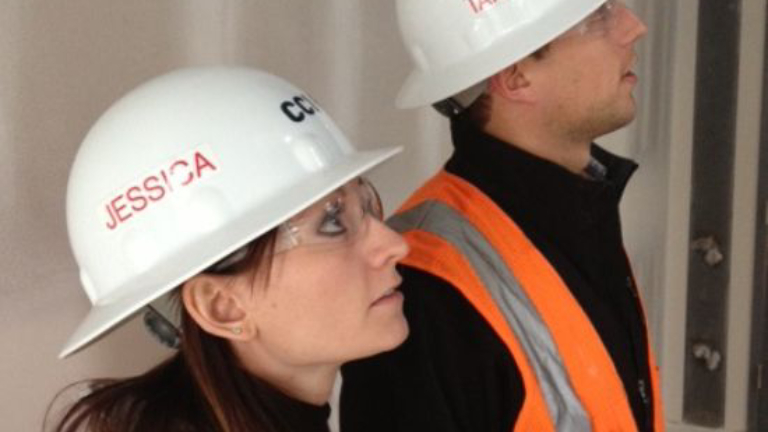Blog
Published: November 02, 2022
Learning from Experts to Become an Expert
Jessica Ely grew up in Western Pennsylvania and fondly remembers visiting her grandparents on the other side of the state, near Philadelphia. Her grandfather worked in the building industry as an inspector and would often take her with him to work.
Quick Facts
- Topics
- Contractor Spotlight
Jessica Ely grew up in Western Pennsylvania and fondly remembers visiting her grandparents on the other side of the state, near Philadelphia. Her grandfather worked in the building industry as an inspector and would often take her with him to work.
“He would put a yellow hardhat on me that was way too big,” said Jessica. “That was my intro to the industry, palling around with him during those couple of weeks each summer.”
Jessica went to Penn State and, after some initial uncertainty, majored in architectural engineering. After college she signed up with a prominent engineering firm in New York and started fast. Her first project was a large resort and casino in Las Vegas – a construction project with 5,000 rooms and a central plant with pipes so big she could fit through them.
Going to (and leaving) Las Vegas
Jessica was a little starstruck at first. Every week, she’d fly to Vegas with architects from firms she had read about in college. It didn’t take long for her to realize she had more to learn.
“I worked really closely with the contracting team, and they would ask me questions and teach me about construction,” said Jessica. “Once, I didn't know there was a flange and the opening I had drawn wasn't big enough for the flange to go through. You graduate from a top program, and you think you know it all, but then you're humbled very quickly by craftsmen.”
When the project was closing out, the contracting company she’d been collaborating with suggested she interview with them – her first step toward becoming a design-build contractor, a path she hasn’t veered from since.

While living in Vegas, Jessica met her future husband and eventually joined him in Salt Lake City. She started working for a design-build contractor with an in-house engineering group.
The Secret to Building Relationships with Clients: Expertise
Jessica started to learn more about how projects are put together and the benefit of bringing engineering expertise to the table with business development to help clients understand why one system might be superior to another.
“This is similar to how Trane works,” said Jessica. “When you have a sales team with technical expertise, it really helps develop that relationship.”
Strong technical knowledge is a great starting point, but active listening has been the difference maker. In one case, a client was deeply committed to sustainability and reducing their building’s carbon footprint, telling Jessica they wanted to put up a billboard on the interstate saying: We took 500 SUVs off the road today. Starting there, Jessica and her colleagues developed a creative, energy-saving solution: make ice each night and then melt it the next day to cool the building.
Relying on Trane Expertise
As a design engineer, Jessica helps determine how the different pieces of the construction puzzle come together. She often goes to Trane experts for more in-depth system knowledge.
“Trane has an expert on compressors, and that expert knows how the compressor fits into the chiller,” said Jessica. “Then there’s an expert who knows how that chiller fits into the plant, and then there’s somebody who knows how the plant integrates into the whole campus. Every step of the way, there’s somebody who can build upon another component. That's really how projects come together.”
Having Trane experts at her disposal has been helpful on many levels. In one case, a client was testing the market to see if they could find a different equipment supplier.
“We went down to their offices with our Trane expert, and we knocked their socks off,” said Jessica. “We showed them every possible HVAC solution and spoke intelligently about them. Now, we’ve completed 20 buildings with that client.”
Embracing Coaching and Mentoring
Now that Jessica is a Vice President with her company, she has ample opportunities to pass on her knowledge and experience to the younger engineers in her department, providing coaching and mentoring. She sees a strong distinction between the two.

She has several female employees she’s mentoring. One interned when she was 17 and has now been with the company for nine years. Her goal is to be the longest tenured employee, though it’s a steep hill – the record is 50 years. “I just look at her and think somebody did this for me; I'm going to do this for her,” said Jessica.
Jessica thrives on the practical application of her knowledge and experience. Working for a design-build contractor, she gets to see the entire process from idea to completed structure.
“What's really nice about working for a contractor is you get to see your designs brought to life,” she said. “Drawings aren’t meant to be conceptual, like somebody else is going to figure out how to make them real. When you work as a design contractor, it's your job to make those ideas a reality.”
